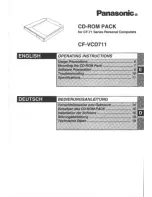
—————— TPD32-EV ——————
128
Manual tuning of field current regulator
n
ote
!
In the majority of the cases the dc motors with an independent excitation operate with a
direct field (
Flux reg mode
= Constant current). In this case it is not necessary to optimize
the regulator of the field current and the regulator of the armature voltage.
The optimization showed below, refers to drives operating with constant power range (armature and field
mixed regulation). In these cases it is necessary to configurate the field converter for this particular use. See below.
n
ote
!
During the optimization of the regulator of the field current, the converter must not receive
a Start command.
- Converter disabled (no voltage on terminal 12)
-
Menu LIMITS / Flux limits:
Flux current max
= 100% equal to the rated field current of the motor.
Flux current min
= 0
-
Set at 0.00 the
Flux I
and
Flux P
parameters in the REG PARAMETERS / ...menu .
- Measure the field current via an analog output. To this purpose the variable “Flux current” has to be param
-
eterized on one output and the variable “Flux reference” on another (see “Input/Output programming”).
- Select the FLUX REGULATION menu.
-
Enable flux reg
= Enabled (default)
-
Flux reg mode
= Voltage control
-
Enable flux weak
= Enabled
-
Set
Gen access
= Flux reference and
Gen amplitude
to 70% of the rated field motor current (this to allow
the overshoot of the system).
-
Increase the value of the
Flux P
parameter till the overshoot of the field current is lower than 4% (
Field curr
).
-
Increase the value of
Flux I
untill the overshoot is higher than 4%, then reduce it slightly lower than 4% .
n
ote
!
Because of the high time constant, the rate of rise of the field current is limited . The increase
time with optimal scale conditions can be last several hundreds of milliseconds.
-
Gen access
= Disconnected
-
Enable flux weak
= Disabled
- Set
Flux current min
at the desired value
- Configure the analog outputs on the basis of your needs.
- Save the settings.
Figures 5.3.6.5 ... 5.3.6.7 show some examples of tuning of the Flux regulator.
Figure 5.3.6.5: Above: Flux reference; Below: Flux current. The regulator
behavior is not good. Jumps are due to field changing.
Figure 5.3.6.6: Above: Flux reference; Below: Flux current. The reduction of
the field current depends on the field time constant. The reg has no influence.
Summary of Contents for TPD32-EV-...-2B
Page 1: ... Instruction manual Industrial Application DC drives TPD32 EV ...
Page 372: ... TPD32 EV 372 9 BLOCK DIAGRAM 9 1 CONTROL BLOCK DIAGRAMS ...
Page 373: ... Instruction manual 373 ...
Page 374: ... TPD32 EV 374 ...
Page 375: ... Instruction manual 375 ...
Page 376: ... TPD32 EV 376 ...
Page 377: ... Instruction manual 377 ...
Page 378: ... TPD32 EV 378 ...
Page 379: ... Instruction manual 379 ...
Page 380: ... TPD32 EV 380 ...
Page 381: ... Instruction manual 381 ...
Page 382: ... TPD32 EV 382 ...
Page 383: ... Instruction manual 383 ...
Page 384: ... TPD32 EV 384 ...
Page 385: ... Instruction manual 385 ...
Page 386: ... TPD32 EV 386 ...
Page 387: ... Instruction manual 387 ...
Page 388: ... TPD32 EV 388 ...
Page 389: ... Instruction manual 389 ...
Page 390: ... TPD32 EV 390 ...
Page 391: ... Instruction manual 391 ...
Page 392: ... TPD32 EV 392 ...
Page 393: ... Instruction manual 393 ...
Page 394: ... TPD32 EV 394 ...
Page 395: ... Instruction manual 395 ...
Page 396: ... TPD32 EV 396 ...
Page 397: ... Instruction manual 397 ...
Page 398: ... TPD32 EV 398 ...
Page 399: ... Instruction manual 399 ...
Page 400: ... TPD32 EV 400 ...
Page 401: ... Instruction manual 401 ...
Page 402: ... TPD32 EV 402 ...
Page 501: ... Instruction manual 501 APPENDIX 3 ACCESSORIES A3 1 EAM Adapter Kit EAM1579 EAM1580 ...
Page 503: ......
















































